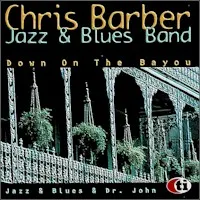Year: 1965
File: MP3@320K/s
Time: 34:22
Size: 83,3 MB
Art: Front
(2:17) 1. Banks of The Bann
(2:16) 2. Alabamy Bound
(3:21) 3. Midnight In Moscow
(2:03) 4. Tom Dooley
(2:28) 5. Streets of Laredo
(2:37) 6. Midnight Special
(2:01) 7. So Long, It's Been Good to Know You
(2:03) 8. When Johnny Comes Marching Home
(2:09) 9. Wimoweh
(3:17) 10. On Top of Old Smokey
(2:14) 11. Kisses Sweeter Than Wine
(2:02) 12. Ha, Ha, This-A-Way
(2:48) 13. Goodnight Irene
(2:38) 14. Bobby Shaftoe
Donald Christopher Barber OBE (17 April 1930 – 2 March 2021) was an English jazz musician, best known as a bandleader and trombonist. As well as scoring a UK top twenty trad jazz hit with "Petite Fleur" in 1959, he helped the careers of many musicians. These included the blues singer Ottilie Patterson, who was at one time his wife, and Lonnie Donegan, whose appearances with Barber triggered the skiffle craze of the mid-1950s and who had his first transatlantic hit, "Rock Island Line", while with Barber's band. He provided an audience for Donegan and, later, Alexis Korner, and sponsored African-American blues musicians to visit Britain, making Barber a significant figure in launching the British rhythm and blues and "beat boom" of the 1960s.
Barber was born in Welwyn Garden City, Hertfordshire, on 17 April 1930. His father, Donald Barber, was an insurance statistician who a few years later became secretary of the Socialist League, while his mother was a headmistress. His parents were left-leaning, his father having been taught by John Maynard Keynes, while his mother became, in Barber's words, "the only socialist mayor of Canterbury". Barber started learning the violin when he was seven years old. He was educated at Hanley Castle Grammar School, near Malvern, Worcestershire, to the age of 15, and started to develop an interest in jazz. After the end of the war, he attended St Paul's School in London, and began visiting clubs to hear jazz groups. He then spent three years at the Guildhall School of Music, and started playing music with friends he met there, including Alexis Korner.More,,,https://en.wikipedia.org/wiki/Chris_Barber
Personnel: Chris Barber (trombone); Pat Halcox (trumpet), Ian Wheeler (clarinet, alto, soprano); Eddie Smith (banjo, guitar); Dick Smith (bass); Graham Burbidge (drums); Ottilie Patterson (vocals, melodica).
Barber was born in Welwyn Garden City, Hertfordshire, on 17 April 1930. His father, Donald Barber, was an insurance statistician who a few years later became secretary of the Socialist League, while his mother was a headmistress. His parents were left-leaning, his father having been taught by John Maynard Keynes, while his mother became, in Barber's words, "the only socialist mayor of Canterbury". Barber started learning the violin when he was seven years old. He was educated at Hanley Castle Grammar School, near Malvern, Worcestershire, to the age of 15, and started to develop an interest in jazz. After the end of the war, he attended St Paul's School in London, and began visiting clubs to hear jazz groups. He then spent three years at the Guildhall School of Music, and started playing music with friends he met there, including Alexis Korner.More,,,https://en.wikipedia.org/wiki/Chris_Barber
Personnel: Chris Barber (trombone); Pat Halcox (trumpet), Ian Wheeler (clarinet, alto, soprano); Eddie Smith (banjo, guitar); Dick Smith (bass); Graham Burbidge (drums); Ottilie Patterson (vocals, melodica).
Folk Barber Style

















